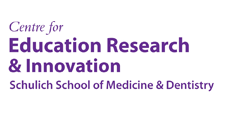Event Title
Training for Skills in Communication, Affiliation, and Reflection: Methods from Narrative Medicine
Start Date
5-10-2011 10:45 AM
End Date
5-10-2011 11:45 AM
Abstract
Purpose
This study sought to fill the gap in knowledge regarding what specific clinical skills could be strengthened through rigorous training in Narrative Medicine (NM), focusing on the areas of communication, collaboration, professionalism, patient‐centeredness, and self‐awareness.
Method
Two qualitative methods (open ended survey questions/focus group) were used to collect process and outcome assessment data from twelve students enrolled in an intensive one‐month NM elective. An iterative thematic analysis of both datasets was carried out by each author. Data triangulation was achieved.
Results
Response rate for the weekly survey was 91% and focus group participation was 50%. Five major findings about the role and potential of NM in medical education emerged: students develop and improve specific communication skills; enhance empathy and affiliation with others; are provided with desired and rare opportunities to reflect on themselves and the practice of medicine; report that the pedagogical approach used in NM training is critical to the dividends; and indicate that current perceptions of NM stymie the potential influence and uptake of this field.
Conclusions
Results from two modes of data collection strongly support the use of NM as a means of developing communication, affiliation, and reflective capability. The authors contend that these skills are integral to medical practice and intrinsic to several core competencies mandated by the Accreditation Council for Graduate Medical Education (ACGME) and the Royal College of Physicians and Surgeons of Canada (RCPSC‐CANMEDs). The findings suggest that the process and dividends of this field can influence the culture of medical training.
This document is currently not available here.
Training for Skills in Communication, Affiliation, and Reflection: Methods from Narrative Medicine
Purpose
This study sought to fill the gap in knowledge regarding what specific clinical skills could be strengthened through rigorous training in Narrative Medicine (NM), focusing on the areas of communication, collaboration, professionalism, patient‐centeredness, and self‐awareness.
Method
Two qualitative methods (open ended survey questions/focus group) were used to collect process and outcome assessment data from twelve students enrolled in an intensive one‐month NM elective. An iterative thematic analysis of both datasets was carried out by each author. Data triangulation was achieved.
Results
Response rate for the weekly survey was 91% and focus group participation was 50%. Five major findings about the role and potential of NM in medical education emerged: students develop and improve specific communication skills; enhance empathy and affiliation with others; are provided with desired and rare opportunities to reflect on themselves and the practice of medicine; report that the pedagogical approach used in NM training is critical to the dividends; and indicate that current perceptions of NM stymie the potential influence and uptake of this field.
Conclusions
Results from two modes of data collection strongly support the use of NM as a means of developing communication, affiliation, and reflective capability. The authors contend that these skills are integral to medical practice and intrinsic to several core competencies mandated by the Accreditation Council for Graduate Medical Education (ACGME) and the Royal College of Physicians and Surgeons of Canada (RCPSC‐CANMEDs). The findings suggest that the process and dividends of this field can influence the culture of medical training.
